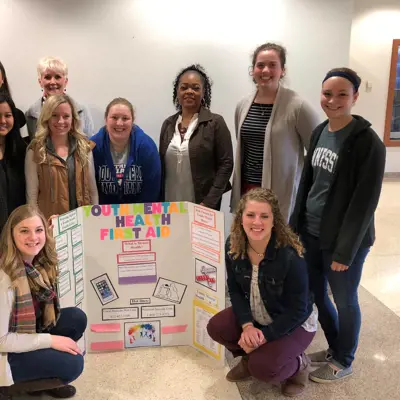
May 3, 2018
With a continuing stigma about mental illness, many attempt to develop a "fake it till you make mentality," trying to hide any perceived shortcomings or anxieties. Deaconess Cross Pointe statistics show that one in four Americans lives with a mental health problem each year. Yet up to two-thirds go without treatment. Kerseclia Patterson, SWI-AHEC academic outreach coordinator, has worked to encourage others to step out from the shadows and embrace and celebrate mental health therapy. "I tell people to 'Celebrate your journey when you decide to get help, and be willing to step out of that fear and shame,'" she said.
She has also played a role in helping others recognize the warning signs of a mental crisis and provided them with the training and tools they need to refer a friend or loved one to the proper resources and care they might need to get through difficult times. As a Youth Mental Health First Aid (YMHFA) instructor, Patterson, along with RaShawnda Bonds, minority health coordinator at the Community Action Program of Evansville, have trained more than 150 people, including USI students and faculty, as well as practitioners working in the field. Through a service learning project, Patterson has worked with USI students to also educate the Evansville community about mental health issues.
YMHFA helps participants identify risk factors, warning signs and a better understanding of a range of mental health problems for those between the ages of 12 and 23. It lays out the five step ALGEE action plan. ALGEE stands for Access for risk of suicide or harm; Listen non-judgmentally; Give reassurance and information; Encourage appropriate professional help; and Encourage self-help and other support strategies. Importantly, according to Patterson, is that it teaches people to "stay in your lane." "We're not equipping you to be clinicians," she said. "It's not on you to diagnose that person. When you recognize something is going on based on the ALGEE plan, you know it's your responsibility to get that person to someone who can help."
Recently, Patterson expanded her own training as well as that of some senior nursing students by undergoing certification in Adult Mental Health First Aid (MHFA,) which recognizes the, at times, more challenging task of assisting the adult age range with mental health struggles. "As an adult, people can often mask it a lot better and we have to find out how they are masking it," said Patterson. "They may have years of cycles we have to breakdown and chisel away at. It's painful to have to reconcile with things in the past that put you in a pit."
Patterson does feel the tide is turning and that more people are able to speak about seeking therapy. For those who are nervous about taking the first step into getting help, Patterson, herself, is willing to assist with that first difficult step. "I've told people at USI that I will walk with them to the Counseling Center. Even if I don't know you, I'll walk with you so you're not alone."